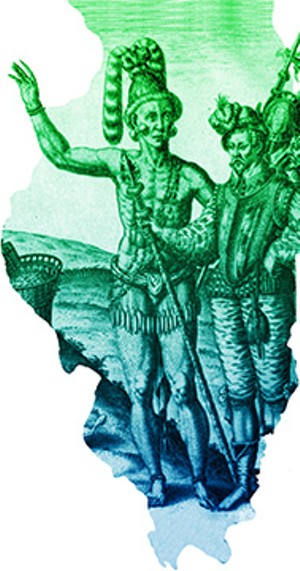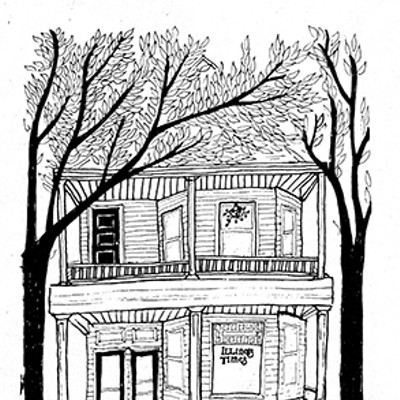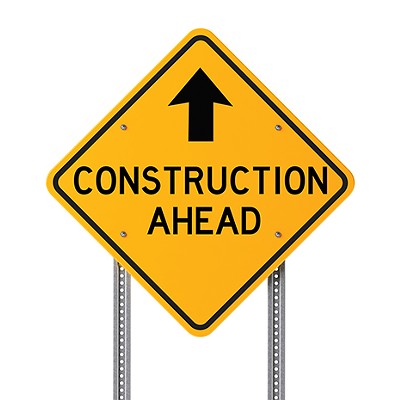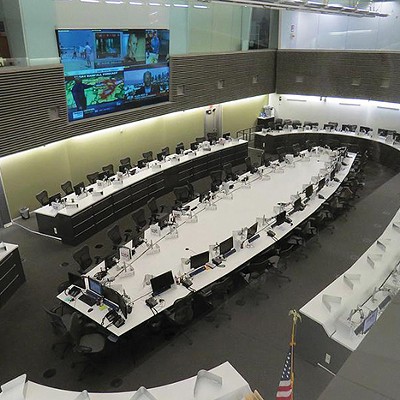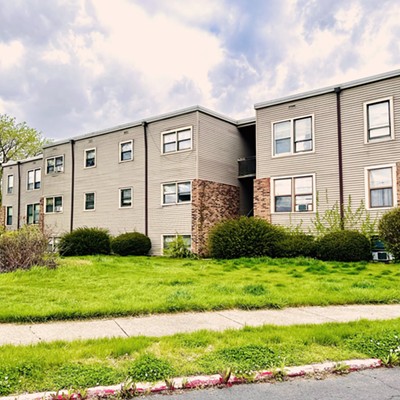Interesting, but not as interesting as how the Miami word irenweewa became our Illinois. McCafferty explains that in Miami pronunciation, it is the next-to-last syllable that is stressed. The French, accustomed to hearing the final syllable of a word stressed, took the next to last syllable in irenweewa to be the final word’s syllable. “The French also changed r to l,” adds McCafferty, “and slightly altered the quality of the second vowel from e to i.” Which is just so French. Then they wrote this mishmash down in accordance with the conventions of 17th century French spelling. Voila! Illinois.
If you assume, as I always did, that those plucky Gauls would have pronounced the name of the future commonwealth as (quoting McCafferty), the way a Parisian visiting Chicago today would pronounce the state’s name – eel-in-wah – we would both be wrong. The French pronounced Illinois as ill-in-weh, and in 17th century French the sound weh was written ois.
So – the French misheard the Indians, and the Americans misread the French, anticipating Rauner and Madigan in a tradition that is now more than 300 years old.
The word Illinois departs from American English as well as from Miami Algonquian in a second respect. McCafferty notes that in American English you would expect Illinois to be pronounced ILL-i-noy, not ill-i-NOY, as it would be in French. And while we do not pronounce the ois in the current French style, we at least respect the original to the extent of leaving the concluding s silent.
Most of us do, anyway. You don’t hear ill-i-noiz much these days, at least not in Illinois. What is surprising is that ill-i-noiz persists at all. In this state’s early days, before radio and TV, it was easy to live and die and never hear the word pronounced any other way. But today, one hears the word pronounced correctly once, twice, a dozen times a day on radio and TV, yet noiz-y speakers persist in believing that they are right and the rest of us, including governors and senators and the like, are wrong. Thus is explained much of our politics.
Its concluding syllable is not the only way that folks flub the pronunciation of Illinois. Anyone with an ear knows that when Lincoln said, “It will all become one thing,” he was referring to our vowels. Our e’s and a’s and o’s and i’s take on weird shapes in our mouths. The website Urban Dictionary tells us that the “actual” – by which I assume is meant the correct – pronunciation of our state name is ill-in-oy. But if you listen carefully you will hear it pronounced hereabouts as ill-eh-noy or ell-eh-noy. I’m not casting aspersions here. I grew up speaking Beardstown, and I get vowels right about as often as I buy winning lottery tickets.
’Twas always thus. The composer of a wonderful booster anthem from the 19th century (to be sung “moderately, with blarney”) titled it “El-A-Noy.” (Here’s a video of a performance of that song by musicians of the Old Town School of Folk Music in Chicago: https://www.youtube.com/watch?v=oKLbLii32WE)
How can we agree on how to govern Illinois if we can’t even agree what to call it? We don’t have what the Brits know as the Queen’s English or, probably more accurately, BBC English, a standard pronunciation useful for communicating across these regional and ethnic divides. We can’t look to the schools to do it; teachers alert to the funding crisis can hardly say the name without sputtering in rage; Lord knows how kids now in school will pronounce the word 10 years from now.
I say adopt the Rauner Rule – if something is too hard to do well, do something simpler instead. We should change the name of our state to Bruce – it’s simpler to say, and this state won’t be the same as the old Illinois anyway once he’s through with it.
Contact James Krohe Jr. at [email protected].

